They want to contribute: Lessons from interviewing young Indians
The bigger picture that emerged from our interactions with the 37 young men and women was of a young India that could soon be free of the curse of Macaulay (everyone of the candidates was articulate but many did not speak very good English), is extremely good at what it does, has the hunger required to do well and get ahead, isn’t obsessed with (although it still leans a little bit towards) conventional career choices, and wants to contribute to society
Last weekend, I flew down to Mumbai to interview the best students from India’s top business schools for a scholarship. With me on the jury were two others – the chairman of a well-known global consulting firm, and one of the partners at the Indian office of another, equally well-known multinational consulting firm. The second and I had gone to engineering school together; he graduated near the top of the class, I was somewhere in the middle.

Over the course of the day, we interviewed 37 students, and it was a learning experience (and tiring, but not tiresome). We spent around 15-20 minutes with each student and while that may have been inadequate to assess some of them, it was more than enough to glean anecdotal evidence of the changes sweeping through this country – some social, others related to business, and still others attitudinal and behavioural (and all entirely transformational).
Read: Youth Survey 2015: Figuring out a young, restless nation
The group was far more heterogeneous than I expected it to be – after all, it was selected from the top 20% of the students (at the time of admission) from the Indian Institutes of Management, XLRI (Jamshedpur) and the Faculty of Management Studies (University of Delhi) and there was a time when most students who went to such schools were fairly similar. Indeed, the only commonality was their sheer academic intelligence, and many wore it lightly.
Two of the young women we interviewed were from small towns in Haryana, the state with the worst gender ratio in India, and from families that had traditionally not believed in educating their womenfolk.
At least a third of the students we met were from small towns, the kind that would be called Tier-II or Tier-III. And many of them were from humble backgrounds. One was the son of a grocer. Another was the first graduate in the family. A couple moved to schools where English was the medium of instruction only in Class X. Several had attended government schools.
Read: Smaller proportion of India’s youth employed
Both are evidence of the continuing trend of upward mobility that characterises today’s India. Even a decade ago, many would likely have not been where they find themselves now.
The group did have a fair share of engineers – as such groups invariably do (as I often tell anyone who cares to listen, engineers rule the world). Many of the engineers had worked after graduation. Interestingly, most had worked in hardware and semiconductor companies. Only one of the engineers had worked in a software services firm. Clearly, even the best and brightest who choose to stay back in this country no longer work for such companies. Is it any wonder that almost all the big Indian software services companies find themselves at the crossroads?
A handful of the candidates with work experience had quit established companies and worked for a start-up for some time before business school. Few had started their own. One continues to run his start-up (a proprietary trading firm in debt) from business school (and with the help of his partners). Many of the 37 said they eventually wanted to start something up, although several did say they wanted to work for a global consulting firm for a few years before doing so. It is evident that India’s start-up wave will continue. According to a 2015 report by software industry lobby group Nasscom, the country has the third highest number of start-ups in the world (around 4,200 then).
Read: Why is the Indian youth agitated?
Some of the young men and women we interviewed spoke of their involvement in social and developmental causes. There’s some amount of resume-padding that happens in most interviews, but even accounting (and discounting) for that, some of their concerns and achievements related to these social causes seemed genuine.
It wasn’t all good, though.
While many of the young people we interviewed had interests other than academics, most of them were extremely uninformed (or ill-informed) about current affairs. For business school students, they displayed a poor knowledge of current economic developments and thinking. Most of them admitted that they do not read newspapers, news websites, magazines, or non-fiction. The few who admitted to reading fiction were found wanting (perhaps by the jury’s exacting standards). A poet had no clue about Yeats’s The Second Coming (which has the famous line, Things fall apart; the centre cannot hold). A Manga-buff had no clue who Osamu Tezuka (the father of Manga) was. Maybe there was more resume-padding going on there.
Read: The youth unemployment conundrum
Still, these are minor quibbles. The bigger picture that emerged from our interactions with the 37 young men and women was of a young India that could soon be free of the curse of Macaulay (everyone of the candidates was articulate but many did not speak very good English), is extremely good at what it does, has the hunger required to do well and get ahead, isn’t obsessed with (although it still leans a little bit towards) conventional career choices, and wants to contribute to society.
Every generation likes to think it is smarter than the ones that came before and after it. After last weekend, I am not sure ours is.
R Sukumar is editor of Mint and tweets as @mint_ed
letters@hindustantimes.com





